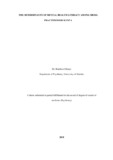| dc.contributor.author | Chitayi, Bonface | |
| dc.date.accessioned | 2019-01-30T08:01:36Z | |
| dc.date.available | 2019-01-30T08:01:36Z | |
| dc.date.issued | 2018 | |
| dc.identifier.uri | http://hdl.handle.net/11295/105984 | |
| dc.description.abstract | Background: Several studies have shown that presentation of pessimistic and imprecise images of mental ill health in the media promotes stigma by perpetuating myths and misconceptions. However few studies exist on mental health literacy of media practitioners – who are the main source of information to the public.
Study Objective: To determine the mental health literacy of media practitioners in Kenya
Method : A total sample of 164 media practitioners working for five media houses in Nairobi were selected using systematic sampling and interviewed using a demographic questionnaire, the mental health knowledge schedule (MAKS) and the attitude to mental illness questionnaire (AMIQ). The collected variables were analyzed using Independent t-test, Pearson correlation, Analysis of variance (ANOVA) and descriptive statistics.
Results: 55% of the respondents were male and 45% were female. The mean knowledge score on MAKS was 44.7, suggesting adequate knowledge of mental illness. The mean attitude score on AMIQ was -5.27 suggesting a negative attitude. The knowledge of mental illness was associated with level of education (p = 0.0298). Media practitioners with a higher level of education of 1st degree (45.2 +/- 4.4) or 2nd degree (45.7 +/- 4.4) had a significantly higher knowledge of mental illness than those with a certificate/diploma (43.0 +/- 5.2). There were no significant differences in the level of comprehension of mental illness based on the marital status (P = 0.2056), age (P = 0.9228) or gender (P = 0.0672). There were no significant differences in the attitude towards mental illness based on marital status (P = 0.8927), age (P = 0.9655), gender (P = 06200) or educational level (P = 0.1637). There was no association between awareness of mental illness and attitude towards mental ill health (Pearson correlation = -0.100, P = 0.203).
Conclusion: The study showed that media practitioners in Kenya have adequate overall knowledge of mental sickness but a negative attitude towards mental ill health. A higher level of education is associated with better mental health literacy. The finding of a negative attitude towards mental illness provides a likely explanation for negative portrayal of mental illness in the media in the past and portends a risk to public mental health education in future. | en_US |
| dc.language.iso | en | en_US |
| dc.publisher | University of Nairobi | en_US |
| dc.rights | Attribution-NonCommercial-NoDerivs 3.0 United States | * |
| dc.rights.uri | http://creativecommons.org/licenses/by-nc-nd/3.0/us/ | * |
| dc.subject | The Determinants of Mental Health Literacy Among Media Practitioners Kenya | en_US |
| dc.title | The Determinants of Mental Health Literacy Among Media Practitioners Kenya | en_US |
| dc.type | Thesis | en_US |
| dc.description.department | a
Department of Psychiatry, University of Nairobi, ; bDepartment of Mental Health, School of Medicine,
Moi University, Eldoret, Kenya | |



